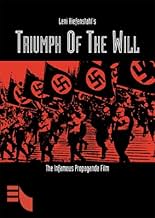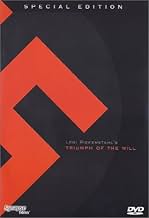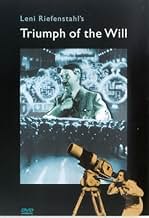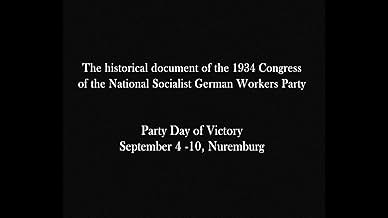IMDb-BEWERTUNG
7,1/10
19.222
IHRE BEWERTUNG
Ein Propagandafilm zum nationalsozialistischen Parteitag 1934 in Nürnberg.Ein Propagandafilm zum nationalsozialistischen Parteitag 1934 in Nürnberg.Ein Propagandafilm zum nationalsozialistischen Parteitag 1934 in Nürnberg.
- Regie
- Drehbuch
- Hauptbesetzung
- Auszeichnungen
- 1 Gewinn & 1 Nominierung insgesamt
Empfohlene Bewertungen
Utterly brilliant film that was unfortunately very difficult to find (along with some other great films by propaghandist directors like Sergei Einsten)until a dvd release recently . Just look at the long shots. Absolutely no cameras visible. Truly meticulous work. Astounding score. The opening sequence of Hitler's descent is brilliant artistry, with the director creating the implicit parallel of God's descent from heaven. Excellent film for anyone remotely interested in politics since all these techniques are routinely used in campaign ads. People often neglect to realize the inherent politicality of all art. Art's politics is at its most dangerous when we fail to realize this simple truth - art and politics are inextricably linked. Do you think there's not a reason why the American market will soon be glutted with war films as we prepare for one? gee, i wonder. Riefenstahl is an amazing director, one that should have done more films. When we censor great works for fear of "what they might do to the 'ignorant'", we're a lot closer to the fascists than their detractors.
10benhur47
Whatever ones beliefs this is amazing. Leni Riefenstahl was a great director with amazing vision.Not alone is there all the marching and saluting which one would expect from a documentary filmed in Nazi Germany but Riefenstahl also gives snap shots of the people who are in the crowd at the various events.The looks of amazement and zeal on the faces of many who are watching is testimony, in my opinion ,to how mesmerizing an event this was.Riefenstahl captures the atmosphere and the excitement of this event.The last seen where Hitler is giving a fiery speech shows Riefenstahls genius at work.The camera angles are amazing and give a feeling of being there.I would highly recommend this not only to historians but also to students of film.
In 1934, the Nazi fortress was built on the election of Adolf Hitler as chancellor, the timely death of Hindenburg, and the infamous purge that caused the deaths of hundreds of SA members, the most emblematic one, being Rohm. Hitler's aura was then total but he needed to touch the German people in the broadest way. Only the big screen could fulfill the ambitious challenge of controlling the people at a distance by immortalizing the Nuremburg Rally of 1934.
Indeed, in the 30's, in a totalitarian system, a man with a camera could be more powerful than any soldier, but this wasn't a man who was assigned the task, but a woman, a promising talent named Leni Riefenstahl. And "Triumph of the Will" is a triumph on the field of film-making as it delivers some of the most spectacular and impressively creative shots for their time as if Riefenstahl was driven by the same desire to try new techniques, like Orson Welles when he made "Citizen Kane", six years later. But there's a reason why "Citizen Kane" is considered a masterpiece and not "Triumph of the Will", and the answer comes from Orson Welles himself.
Welles said that you could make a masterpiece in anything: even in pornography, if you intended to excite people and stimulate them sexually. However, you could never make a masterpiece that happens to be a pornographic film, because a libido is too low and too easily aroused in the first place. I paraphrased him in my review of "Lifeboat" to explain that propaganda, reprises the same role as pornography: it arouses easy emotions, in that case, instinct of superiority. In other words, you can make a masterpiece of propaganda, but not a masterpiece that happens to be a 'propaganda' film. So if I want to stick to my guns and follow my logic, I would say "Triumph of the Will" is a masterpiece of propaganda, but not a masterpiece.
Does this really matter? Well, inasmuch as Riefenstahl claimed that she made a documentary, capturing a significant chapter of Germany's history, I think it's important to set things straight, call a spade a spade and "Triumph of the Will" propaganda. It has an indubitable documentary value, but only from the perspective of a non-Nazi sympathizer, which doesn't only mean the majority of people born after the War, but even the majority of non-German people at the very time of the film's release. I'm not sure Riefenstahl wanted to address the German people with a simple 'documentary' movie, not one that 'objectively' exhilarates Hitler's success in making the eagle rise from the ashes of World War I and the infamous Treaty of Versailles.
And this constitutes the prologue of the film, depicting Germany's recovery's as a miracle only 19 months after Hitler's election, and the next shot sets the tone. While you expect to see a swastika or some marching soldiers taken in reverse shot, what do you get? Clouds. It's a heavenly sight taken from Hitler's private plane, featuring him like an Angel coming from the sky, to save Germany. This is a very clever trick that foresees the uses of religious undertones in each shot. Hitler is like a messianic figure acclaimed by crowds all reassembled to cheer and shout for him. Even the rallies at night, with the flags and torches carry a strange mysticism that Leni's eye never fails to catch.
And this is a fearsome sect-like atmosphere where each sentence shouted, sometimes eructed in that guttural German accent is followed by Pavlovian "Sieg Heil". It's not people shouting, it's one voice in unison and this is another aspect of the film: masses; and Riefenstahl knows how to handle them. In the Nazi conception of people, there's no individuality, there's no possible order when you consider each person's specificity, because by doing so, you accept the presence of "parasites" and we know where this judgment leads No, each individual is like an atom linked to another one and assembling into one homogeneous form, a mass.
Look at these shots of workers carrying their shovels like rifles, at these young men during the roll call, or in their tents before Hitler's arrival, they all look the same, shirtless and smiling, either same uniform or same absence of uniform. There is a vertiginous shot at World War I memorial, perhaps the most beautiful of the film, where Hitler walks between rows of soldiers. The mass was so compact, that I thought it was a garden at first. This is a film made by a director who knows exactly the effects to create. Of course, she's right when she says that there's no anti-Semitic statement in the film, but that's beside the point. Such a movie touched German people and convinced the rest of skeptics that the salvation come from Hitler, so when the next rally of Nuremburg lead to the racial laws, the receptiveness of the people owed a little to this masterpiece of propaganda.
That said, I'm inclined to believe that Leni Riefenstahl, like a vast majority of Germans, believed, that salvation could only come from Hitler, and that she genuinely wanted to highlight this in her 'documentary'. Let's not just dismiss the film for what it is, and not get things mixed up. Its merit is not to be a documentary about a rally, it's too biased for that, but to provide hints of answers for the questions that come to mind after watching World War II or holocaust movies: how could that happen? Well, "Triumph of the Will" is almost meta-referential in the way the people's zeal is echoed by the filmmaker's stylistic approach. People wanted to believe in Hitler, they might have regretted it after, but they succumbed to his 'charisma' and in a way, his "will" as evil as it was, had triumphed.
It's only on the basis of this historical magnitude that the film can be considered great.
Indeed, in the 30's, in a totalitarian system, a man with a camera could be more powerful than any soldier, but this wasn't a man who was assigned the task, but a woman, a promising talent named Leni Riefenstahl. And "Triumph of the Will" is a triumph on the field of film-making as it delivers some of the most spectacular and impressively creative shots for their time as if Riefenstahl was driven by the same desire to try new techniques, like Orson Welles when he made "Citizen Kane", six years later. But there's a reason why "Citizen Kane" is considered a masterpiece and not "Triumph of the Will", and the answer comes from Orson Welles himself.
Welles said that you could make a masterpiece in anything: even in pornography, if you intended to excite people and stimulate them sexually. However, you could never make a masterpiece that happens to be a pornographic film, because a libido is too low and too easily aroused in the first place. I paraphrased him in my review of "Lifeboat" to explain that propaganda, reprises the same role as pornography: it arouses easy emotions, in that case, instinct of superiority. In other words, you can make a masterpiece of propaganda, but not a masterpiece that happens to be a 'propaganda' film. So if I want to stick to my guns and follow my logic, I would say "Triumph of the Will" is a masterpiece of propaganda, but not a masterpiece.
Does this really matter? Well, inasmuch as Riefenstahl claimed that she made a documentary, capturing a significant chapter of Germany's history, I think it's important to set things straight, call a spade a spade and "Triumph of the Will" propaganda. It has an indubitable documentary value, but only from the perspective of a non-Nazi sympathizer, which doesn't only mean the majority of people born after the War, but even the majority of non-German people at the very time of the film's release. I'm not sure Riefenstahl wanted to address the German people with a simple 'documentary' movie, not one that 'objectively' exhilarates Hitler's success in making the eagle rise from the ashes of World War I and the infamous Treaty of Versailles.
And this constitutes the prologue of the film, depicting Germany's recovery's as a miracle only 19 months after Hitler's election, and the next shot sets the tone. While you expect to see a swastika or some marching soldiers taken in reverse shot, what do you get? Clouds. It's a heavenly sight taken from Hitler's private plane, featuring him like an Angel coming from the sky, to save Germany. This is a very clever trick that foresees the uses of religious undertones in each shot. Hitler is like a messianic figure acclaimed by crowds all reassembled to cheer and shout for him. Even the rallies at night, with the flags and torches carry a strange mysticism that Leni's eye never fails to catch.
And this is a fearsome sect-like atmosphere where each sentence shouted, sometimes eructed in that guttural German accent is followed by Pavlovian "Sieg Heil". It's not people shouting, it's one voice in unison and this is another aspect of the film: masses; and Riefenstahl knows how to handle them. In the Nazi conception of people, there's no individuality, there's no possible order when you consider each person's specificity, because by doing so, you accept the presence of "parasites" and we know where this judgment leads No, each individual is like an atom linked to another one and assembling into one homogeneous form, a mass.
Look at these shots of workers carrying their shovels like rifles, at these young men during the roll call, or in their tents before Hitler's arrival, they all look the same, shirtless and smiling, either same uniform or same absence of uniform. There is a vertiginous shot at World War I memorial, perhaps the most beautiful of the film, where Hitler walks between rows of soldiers. The mass was so compact, that I thought it was a garden at first. This is a film made by a director who knows exactly the effects to create. Of course, she's right when she says that there's no anti-Semitic statement in the film, but that's beside the point. Such a movie touched German people and convinced the rest of skeptics that the salvation come from Hitler, so when the next rally of Nuremburg lead to the racial laws, the receptiveness of the people owed a little to this masterpiece of propaganda.
That said, I'm inclined to believe that Leni Riefenstahl, like a vast majority of Germans, believed, that salvation could only come from Hitler, and that she genuinely wanted to highlight this in her 'documentary'. Let's not just dismiss the film for what it is, and not get things mixed up. Its merit is not to be a documentary about a rally, it's too biased for that, but to provide hints of answers for the questions that come to mind after watching World War II or holocaust movies: how could that happen? Well, "Triumph of the Will" is almost meta-referential in the way the people's zeal is echoed by the filmmaker's stylistic approach. People wanted to believe in Hitler, they might have regretted it after, but they succumbed to his 'charisma' and in a way, his "will" as evil as it was, had triumphed.
It's only on the basis of this historical magnitude that the film can be considered great.
10AK47_600
No matter what you think of Nazis this film is brilliant. It was the first of the kind political documentary. The beginning may bore some viewers, but those who stay will be rewarded by some of the most famous documentary footage ever shot. I feel I could see this movie a few times without being bored. In fact, the more you watch the more fun it is.
....although, in this case, once may be more than enough for some people. It's technically innovative, with several amazing camera shots, but the content is hollow and repetitive; if you make it through the endless parade footage, Hitler's final speech is the most inflammatory - and revealing. One thing that is made clear, however, is how hypocritical it is to retroactively condemn director Leni Riefenstahl for being seduced by the Nazi ideology at that point in time, when millions of Germans (and others around the world) were far more vocal in their support of the Fuhrer. *** out of 4.
Wusstest du schon
- WissenswertesThe film spent six months in the editing suite. The two-hour running time represents approximately 3% of the footage Leni Riefenstahl shot.
- Zitate
[last lines]
Rudolf Hess: The Party is Hitler. But Hitler is Germany as Germany is Hitler! Hitler, Sieg Heil! Sieg Heil!
crowd: Heil! Heil! Heil!...
- Alternative VersionenThere is an Italian DVD edition of this movie, distributed by DNA Srl. The movie was re-edited with the contribution of the film history scholar Riccardo Cusin. This dvd contains the movie with its original aspect ratio and a new version adapted in 1.78:1 anamorphic for 16:9 screens. This version is also available in streaming on some platforms.
- VerbindungenEdited into Hitler Lives (1945)
- SoundtracksDie Fanhe Hoch (Raise High the Flag)
Horst Wessel
Top-Auswahl
Melde dich zum Bewerten an und greife auf die Watchlist für personalisierte Empfehlungen zu.
- How long is Triumph of the Will?Powered by Alexa
Details
- Erscheinungsdatum
- Herkunftsland
- Sprache
- Auch bekannt als
- Das Dokument vom Reichsparteitag 1934
- Drehorte
- Produktionsfirmen
- Weitere beteiligte Unternehmen bei IMDbPro anzeigen
Box Office
- Budget
- 280.000 DM (geschätzt)
- Laufzeit1 Stunde 54 Minuten
- Farbe
- Seitenverhältnis
- 1.37 : 1
Zu dieser Seite beitragen
Bearbeitung vorschlagen oder fehlenden Inhalt hinzufügen

Oberste Lücke
By what name was Triumph des Willens (1935) officially released in India in English?
Antwort



























